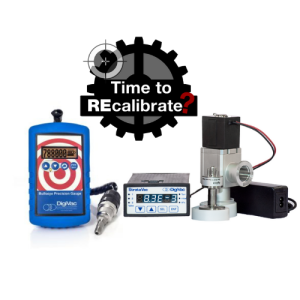The Importance of Calibrating Your Vacuum Gauges

Making sure that your measuring equipment is properly calibrated is not something that you can afford to miss. A gauge that hasn’t been properly calibrated in some time can lead to inaccurate vacuum readings. This is because over time the sensor or gauge tube can become contaminated or affected by your vacuum process. This is especially true if your process has a lot of condensable gasses or is “dirty”. The factory calibration can degrade overtime. Inaccurate readings could provide inconsistent control of your process or less than accurate vacuum reading inputs to your PLC. For these reasons and more it is important to do regular calibrations of your vacuum gauges. Let’s dig in a bit more.
Getting Reliable Results
Arguably the most important reason to calibrate your vacuum gauge is that it will give you more accurate results. At DigiVac we calibrate or “pair” each sensor to the gauge. In our research, the as found accuracy of sensors can be quite variable. When we calibrate a specific sensor to a specific controller we are fine-tuning the accuracy of the pair. You can rely on the readings you see and they will be consistent with our listed accuracy specifications, which by the way are even better than what you see listed for the individual sensor specs. We recommend yearly calibrations for our gauges and controllers. One of the most common things we see is that sensors can fail in the field. We find just swapping out the sensor in the field can affect your accuracy by as much as 20%! Many of our pharmaceutical customers have their gauges calibrated more frequently and request a NIST calibration. We calibrate every gauge and controller to NIST standards, but a NIST calibration will provide you with a certificate of before (as found) and after data that you can use in your cGMP documentation practices.
Keeping your gauge and controllers calibrated gives you the peace of mind that your vacuum readings are reliable and reproducible. Reproducibility is a key component of quality test results. Consider the pharmaceutical industry, where accurate and reproducible results are critical to the end product. Add a scheduled calibration to your vacuum process SOP so you don’t forget this important practice.
Catching Problems Early
Remember that NIST calibration I mentioned earlier? Keeping a NIST certificate on file, can serve as a diagnostic tool if your vacuum readings start to seem off. Is it your vacuum instrument or a leak in your system? Calibration is a great diagnostic tool. If you aren’t sure what is going on with your system, a calibration gives you as found numbers that you can compare to the calibrated numbers. If your gauge was indeed off, then you can ascertain if you have a system performance problem, or a measurement problem. Think of calibrations like you think about baselining your vacuum pump. Knowing what your pump can get to “fresh out of the box” will give you an alert if it is unable to reach those base pressures any longer and maintenance is required. It is the same for vacuum equipment, if you think something may be off with your vacuum gauge then send it in for calibration and keep your vacuum instruments in top working order so that your vacuum applications aren’t affected by inaccurate results.
When you are in the market for vacuum gauge calibration services, DigiVac is here to help you out. We want you to have peace of mind, knowing that your vacuum gauges and vacuum controllers have been inspected and calibrated by highly trained professionals. And if you have a broken gauge or controller…don’t worry we offer repair services too!
